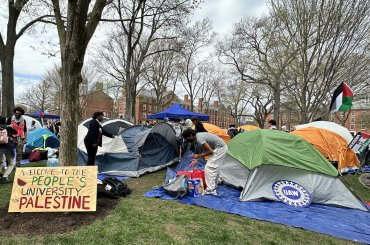Reaction to the recent announcement by Ben & Jerry’s that they will no longer allow their ice cream to be sold in illegal Israeli settlements has highlighted a new and encouraging trend among Palestine solidarity activists. Social media was full of posts about the limitations of boycotts that address only Israeli settlements and the need to expand the BDS grassroots work beyond such confines.
This issue has played out even among the corporate players in the recent ice-cream fiasco, as Ben & Jerry’s said they were not consulted by parent company Unilever in adding the last line in their statement assuring everyone that “Although Ben & Jerry’s will no longer be sold in the OPT, we will stay in Israel through a different arrangement.”
Palestinian activists, especially the new generation, were joined by the Movement for Black Lives in the U.S. in emphasizing that there must be an end to all business with apartheid Israel. They welcomed the partial victory represented by Ben & Jerry’s decision but insisted that the Israeli state can’t be separated from its apartheid and military occupation. The same position was taken by Vermonters for Justice in Palestine, who initiated and led the decade-old campaign. According to VTJP member Kathy Shapiro “By maintaining a presence in Israel, Ben & Jerry’s continues to be complicit in the killing, imprisonment and dispossession of Palestinian people and the flaunting of international law. Israel destroys lives and property in the lands it occupies by force.”
Ahmad Abuznaid, US Campaign for Palestinian Rights Executive Director, noted: “For Ben & Jerry’s to fully commit to justice, there must be no scoops left behind under apartheid. Until there are none, we are not done.”
Even some voices in Israeli media touched on the subject. Gideon Levy wrote in Ha’aretz on July 22: “Therefore, the situation demands nothing less than a real boycott of Israel, of all Israelis, everywhere – a painful, costly, destructive one. Not a boycott-lite on the ice cream sold at the Rami Levy supermarket at the Etzion Junction, but one that all of Israel will feel in its pocket.”
Many also pointed out that Ben & Jerry’s business in the illegal settlements is only a small percentage of their business with Israel, and that the contract that is being cancelled is still valid for another year and a half. A year and a half in which Zionist lobby groups may well succeed in reversing even this limited decision.
Gone are the days when many activists felt they must temper their comments and “soft sell” the demand to boycott all of Israel, its entire state apparatus and any complicit companies. Of course, campaigns against illegal settlement products do have a place in the Boycott Israel movement, but they must be a first step towards something more. They should be a way to open up space for the dialogue on Israeli apartheid and why it should be shunned. The danger lies in letting settlement boycotts become the dominant feature of BDS work and allowing their limited parameters to set and restrict the agenda for most Boycott Israel work.
A further danger of focusing mainly, or only, on settlement boycotts is that it reinforces the faulty concept that the two-state solution is still viable and a worthwhile goal for Palestine advocacy. It traps activists in this circular spin that falsely gives the impression to supporters that the illegal settlements are the most important obstacle to any genuine peace with justice for Palestinians.
Most Palestinians, and now even leading human rights groups, will tell you that Israel’s apartheid system is the underlying issue and that the military occupation is simply one manifestation of that pernicious system. Furthermore, the response by the Israeli government and its lobby to the Ben & Jerry’s move reinforces that analysis; Israeli officials have dropped the façade of making any distinction between the settlements and the rest of Israel, something Western governments chose to ignore.
A new consensus is forming in the Palestine solidarity movement. Many activists are re-tuning their focus to emphasize Boycott Israel, or more accurately, Boycott Israeli Apartheid, in their actions and messaging. And Palestinians, who have been struggling for over 70 years against this racist colonial oppression, certainly welcome the change.



Yes, go for it. Boycott Israel, just like the world boycotted Apartheid South Africa. Enough of the occupation, theft of lands, illegal settlements, and the killing of unarmed civilians.
The world just witnessed and were shocked at Israel’s violence in Gaza, so NOW would be the time to boycott Israel.
“Rather than simply boycotting Israeli settlements, activists are now focused on boycotting Israeli Apartheid.”
That’s indeed so and it is an intolerably sad state of things.
It would have been constructive to analyze why it’s taking so long for the penny to drop.
Who or what led, directly or indirectly — by controlling opinion, dominating organizations, ensuring censorship, short, manufacturing consent — to the fact that these “activists” were not “focused” on any attack against Zionism itself but were instead instrumentalized to participate in the Zionist propaganda that legitimated the rape of Palestine in the public mind? That was done by contrasting the post-67 conquest to a “recognized”, pre-67 colonial invasion with ethnic cleansing and occupation, making the latter appear legitimate/recognized.
While militant support to Palestinian resistance had not waited for 1967 to boycott all Zionists along with the Zionist entity and its most conspicuous helpers, the unfortunately non-clandestine BDS institutional body (living in Palestine under direct control of the military occupation), did instead devolve leadership to tribal not-anti-but-non-Zionist organizations, flush with cash and influence and shady links to Zionists. The action of the latter revealed their two objectives: 1. destroying effective, principled antizionists by character assassination, under the overriding goal of “fighting antisemitism”; 2. limiting boycott activity to post-1967 occupation; see above. They had the complicity of a majority of the liberals.
This, as the author notes, is timidly starting to unravel. The current unraveling is owed more to the hubris of an openly Nazioid Likud government than any of the tribal-centered “not-a-Zionist” or anti-apartheid-but-not-anti-invasion” groups.